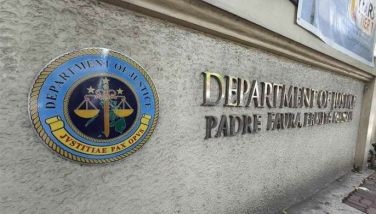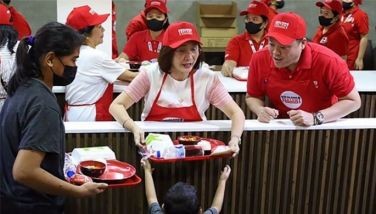Kinder Plus: Early child care in the countryside
April 21, 2003 | 12:00am
When the chance to be part of Kinder Plus, a pilot project for early childhood development, came the way of Nueva Ecija municipalities, Mayors Amado Corpus and Gloria Crespo Congco of Cuyapo and Cabiao, respectively, readily said yes.
Corpus was yet unmindful that 37 percent of the total Filipino population is aged zero to six years old, the great majority of whom has little access to institutional pre-school care.
What Corpus knew was that early inputs to children were very crucial and that even if his local government had budget constraints, the aims of Kinder Plus for child formation and increased parenting awareness and responsibility had deep roots and were well-worth spending for.
For Congco, Kinder Plus bore the buds for good citizenship. "We can build good bridges but if we don’t have good citizens, they redound to nothing," he said.
Launched three years ago, Kinder Plus is a pilot test for Republic Act 8980 or the Early Childhood Care and Development (ECCD) Act, which was passed in 2000.
The law promotes early childhood care that is comprehensive, integrative and sustainable. To be all these, it was essential for the law to be multisectoral and collaborative among government entities and agencies, service providers, families and communities.
Kinder Plus is carried out in six Nueva Ecija towns by the Department of Education, together with the Community of Learners Foundation (COLF) and the office of Sen. Tessie Aquino-Oreta, author of RA 8980.
It involves the commitment of local government units for funding and the activation of ECCD teams, composed of community social and health workers and education representatives.
Also with the help of parent "volunteers," Kinder Plus is actualized week in and week out in "playgroups" of as many of 30 to 40 children in host areas such as a spacious frontyard, such as that in Barangay Tutuloy, Cuyapo.
Songs, rhymes and games impart lessons related to reading and writing, hygiene, nutrition, family and community relationships and the environment.
Importantly, Kinder Plus also directs its attention to parents, making them realize the value of quality attention to child-rearing.
Through Kinder Plus, social workers also see up close family dynamics, while health workers regularly interact with parents for the implementation of government-mandated services.
Corpus was yet unmindful that 37 percent of the total Filipino population is aged zero to six years old, the great majority of whom has little access to institutional pre-school care.
What Corpus knew was that early inputs to children were very crucial and that even if his local government had budget constraints, the aims of Kinder Plus for child formation and increased parenting awareness and responsibility had deep roots and were well-worth spending for.
For Congco, Kinder Plus bore the buds for good citizenship. "We can build good bridges but if we don’t have good citizens, they redound to nothing," he said.
Launched three years ago, Kinder Plus is a pilot test for Republic Act 8980 or the Early Childhood Care and Development (ECCD) Act, which was passed in 2000.
The law promotes early childhood care that is comprehensive, integrative and sustainable. To be all these, it was essential for the law to be multisectoral and collaborative among government entities and agencies, service providers, families and communities.
Kinder Plus is carried out in six Nueva Ecija towns by the Department of Education, together with the Community of Learners Foundation (COLF) and the office of Sen. Tessie Aquino-Oreta, author of RA 8980.
It involves the commitment of local government units for funding and the activation of ECCD teams, composed of community social and health workers and education representatives.
Also with the help of parent "volunteers," Kinder Plus is actualized week in and week out in "playgroups" of as many of 30 to 40 children in host areas such as a spacious frontyard, such as that in Barangay Tutuloy, Cuyapo.
Songs, rhymes and games impart lessons related to reading and writing, hygiene, nutrition, family and community relationships and the environment.
Importantly, Kinder Plus also directs its attention to parents, making them realize the value of quality attention to child-rearing.
Through Kinder Plus, social workers also see up close family dynamics, while health workers regularly interact with parents for the implementation of government-mandated services.
BrandSpace Articles
<
>
- Latest
- Trending
Trending
Latest
Trending
Latest
Recommended





























